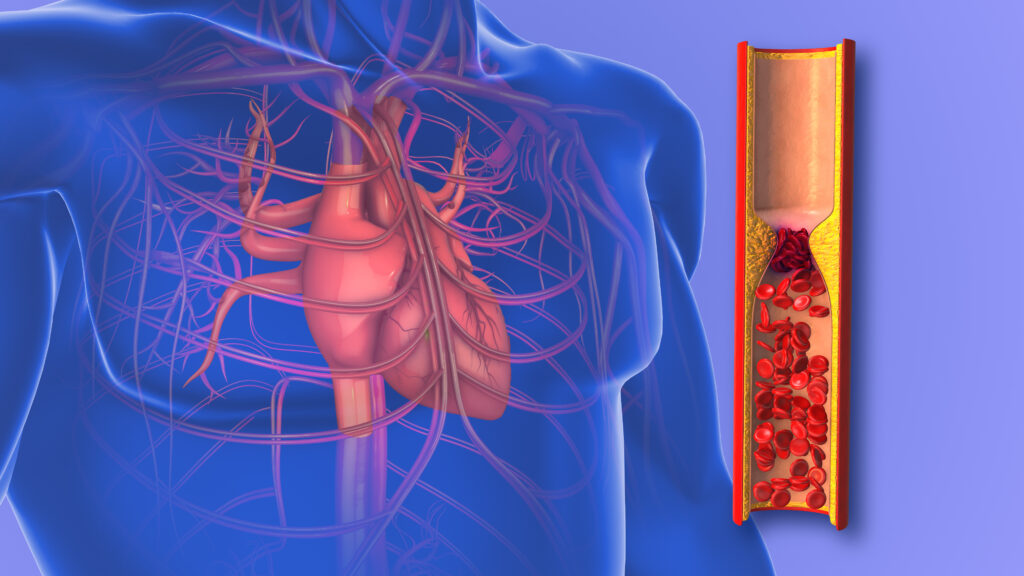
Your good health has an enemy — atherosclerosis. Atherosclerosis is common. And its effects can be very serious. This condition can lead to strokes, heart attacks, and death. But, you can take steps to protect yourself from this disease.
What is atherosclerosis?
The inside walls of healthy arteries are smooth and clean. This makes it easy to transport the blood your body needs. But arteries can become clogged. Fatty substances like cholesterol can stick to artery walls. These deposits are called plaque. Plaque can eventually slow or block the flow of blood. This blockage is atherosclerosis. It can affect any artery in your body. When atherosclerosis affects the arteries that supply blood to the heart, it is called coronary artery disease. Two things may occur when a plaque develops. A plaque may break off or a blood clot may form on the plaque's surface. If either of these situations occur, it may lead to a blockage of an artery and ultimately a heart attack or stroke.
How is cholesterol measured?
The National Heart, Lung, and Blood Institute recommends that all adults older than 20 have their cholesterol level checked every five years. This is done with a blood test. The test should measure total cholesterol, LDL ("bad") cholesterol, HDL ("good") cholesterol, and triglycerides. Talk with your healthcare provider about your target cholesterol levels.
Am I at risk?
If you are older than 20 and have been eating a typical Western diet, chances are atherosclerosis has already begun. Risk factors include:
- High cholesterol
- High triglycerides
- Smoking
- High blood pressure
- Insulin resistance, Prediabetes, or Diabetes
- Being overweight or obese
- Sedentary lifestyle
- Sleep apnea
- Stress
- Excessive consumption of alcohol
Inflammation is the underlying cause of atherosclerosis and many other serious diseases. The following tips can help prevent atherosclerosis and improve your general health. If you have atherosclerosis, you may be able to stop it from getting worse.
1. Check Your Teeth
In a new study published in the British Medical Journal, researchers found that people with poor oral hygiene had a 70 percent increased likelihood of developing heart disease compared to those who brushed regularly.
Because gum disease can cause atherosclerosis, it is vital to brush your teeth at least twice a day and floss daily. Flossing breaks up bacteria colonies in the gums that can get into the bloodstream and cause infection and inflammation in other parts of your body.
Most importantly, be sure to have regular dental checkups and get your teeth cleaned every six months to remove plaque buildup. If this is not removed, you are very likely to get periodontal disease, which contributes to heart disease.
RELATED: 5 Foods That Are Clogging Your Arteries
2. Fish oil
Try taking 2000mg of fish oil daily. EPA and DHA, fish oil’s primary omega-3 fatty acids, reduce inflammation, lower blood lipids (especially triglycerides), improve blood viscosity, and normalize heart rhythms. Taking these supplements can reduce cardiovascular mortality by as much as 45 percent. Reduce the suggested amount if you eat fish three times per week. Metagenics, a great fish oil, can be found in the Myers Detox Store. Cod liver oil also has some great benefits.
3. Go for Garlic
Besides making the obvious changes to your diet like opting for whole grains, less saturated fats, etc., garlic is rich inantioxidants and increases nitric oxide production. In a study of 15 men with coronary heart disease, researchers found that 2.4 grams of aged garlic extract reduced endothelial dysfunction by 44 percent. It’s best to eat either raw garlic or aged (fermented) garlic, but you can also take Kyolic aged garlic extract.
4. Smoking
If you smoke, stop. Scientists have shown smoking damages the artery walls, which can lead to atherosclerosis. This makes it easier for plaque to build up. Smoking is even riskier when you have other risk factors like high blood pressure or diabetes.
If you need help quitting, talk with your healthcare provider. He or she has information on medicines, nicotine replacement products, and programs to make it easier. Also, avoid places where there is cigarette smoke. Research suggests that smoke from others can increase your risk of atherosclerosis.
RELATED: Smoking Creates Long-Lasting Risk for Clogged Leg Arteries
5. Exercise
Exercise regularly. Regular aerobic exercise can help fight atherosclerosis by reducing the amount of fat in your blood, lowering your blood pressure and cholesterol, and controlling your weight.
It's never too late to start exercising. Brisk walking, swimming, and bicycling are good choices. It's OK to start slowly and work up to at least 30 to 40 minutes, 4 to 5 days a week. But before you begin, ask your healthcare provider's advice about what kind of exercise program is right for you.
6. Checkups
Get regular checkups. Have your healthcare provider check your blood pressure and cholesterol. High blood pressure can further complicate atherosclerosis by causing artery walls to harden and thicken. This condition is called arteriosclerosis. Talk about your health and your risk factors for atherosclerosis with your provider.
7. Know Your Diabetes Do's/Don'ts
Control diabetes with your healthcare provider's help. People who have diabetes develop atherosclerosis more quickly. If you have diabetes, control your blood sugar level carefully.
Will I know if I have it?
Because symptoms appear only after the damage has been done, don't wait for symptoms to develop before doing something about atherosclerosis. Begin by making the above lifestyle changes even if you feel well.
Together, you and your healthcare provider can decide what steps you need to take to stay healthy.
Founded in 1974, the Association of Black Cardiologists, Inc., (ABC) is a nonprofit organization with an international membership of 1,700 health professionals, lay members of the community (Community Health Advocates), corporate members, and institutional members. The ABC is dedicated to eliminating the disparities related to cardiovascular disease in all people of color. Today, the ABC’s public and private partnerships continue to increase our impact in communities across the nation. For more information, visit abcardio.org.









